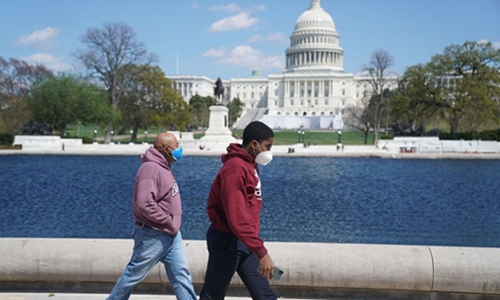Pandemic raises core values conversation in US
By Christopher Cottrell Source:Global Times Published: 2020/4/16 20:43:40

People wearing masks take a walk near the U.S. Capitol building in Washington D.C., the United States, April 11, 2020. Photo:Xinhua
Recent Op-Eds in the New York Times and other media outlets in the US have been discussing how COVID-19 is impacting American core values.I've watched these debates unravel with the faith that these core values remain intact, even if they seem on the surface to be taking different directions. Some are deeming this a new form of American exceptionalism. It's really not — we're only entrenching and magnifying how they're used. This is why we are at an impasse.
Following Shakespeare's famous line in Hamlet, "To be, or not to be, that is the question," it's clear the question now is, "to mask or not to mask?" That depends on if you want "to be" or "not to be."
One of the earliest ways China reacted to the coronavirus was to make mask-wearing mandatory — which stems the transmission of virus-infected vapors.
When COVID-19 began spiking in the US in March, it was evident that hospitals were woefully unprepared. Warnings came from certain quarters not to horde masks and instead save them for frontline healthcare providers. In early April, it became clear that mask wearing by the public helped contain the virus, especially in the absence of mass testing such as the widespread testing that was conducted in both South Korea and Germany.
A doctor colleague of mine from Texas told me that in his hometown, "if people find out you are wearing a mask and not sick, they will know and be talking about you. They think masks should only be for doctors and nurses. Problem is, they watch the cable news. I told them to stop that — to eat their vegetables and read news for facts."
Others feel anger that "they must wear a mask," and fear the state is over-stepping its boundary. Others react with aghast and shame when some people buy up sanitizers and masks and sell them at a premium, while in Asia masks are provided equally to all. China, South Korea, and Singapore, have all taken massive measures to provide the public with masks, soaps and hand sanitizers.
However, the US mask-hysteria debates illustrate core elements of what could loosely be defined as American exceptionalism: staunch individualism, enterprising business spirit, putting checks and balances on the state, while distancing from too much international influence. In many ways for good or for ill, most Americans still believe the British Redcoats might be coming, and cast a wary eye on elements not home-grown. Yes, that's an irony for a country built by immigrants.
Americans love to say that their home is their castle, but don't want to be locked into their towers like Rapunzel. In cities like San Francisco, shelter-in-place orders were accepted and taken seriously. In states like Michigan shelter orders were viewed as treading on individual liberties. They conflate safety orders with the paranoid liberal media crying wolf.
Overall, most Americans are unsure of how to react right now. Many relatives ask me why I can go outside. My answer is that I live in Macao which acted early with masks, sheltering, social distancing and other sharp and smart policies and concerted public messaging.
When my Chinese wife asks why Americans feel a sense of local exceptionalism, I tell her that while China has "one country, two systems," America has "one country, fifty systems," and that does not include our territories ranging from Guam to Puerto Rico. Different states react differently, so will different counties within states. US history and diversity assure an uneven response. The litigious and polarization mean more time will be needed to handle coronavirus. Essentially, we are not responding to this as we did in World War I and World War II or with the Marshall Plan for Europe.
In the American movie Star Trek II: The Wrath of Khan, Captain James T. Kirk sacrifices himself, as Lieutenant Commander Spock says, "Logic clearly dictates that the needs of the many outweigh the needs of the few." Kirk replies, "Or the one."
Kirk's sacrifice here is done in a highly brave and individualistic way.
Looking at the larger popular culture discourse, very few are taking the "or the one" positions.
Doctors and first responders in the US are the people demonstrating American exceptionalism now.
The author is editor of Peace Post (www.peacepost.asia) and South China Sea Magazine online (www.southchinasea.com.cn). opinion@globaltimes.com.cn
RELATED ARTICLES:
Posted in: VIEWPOINT